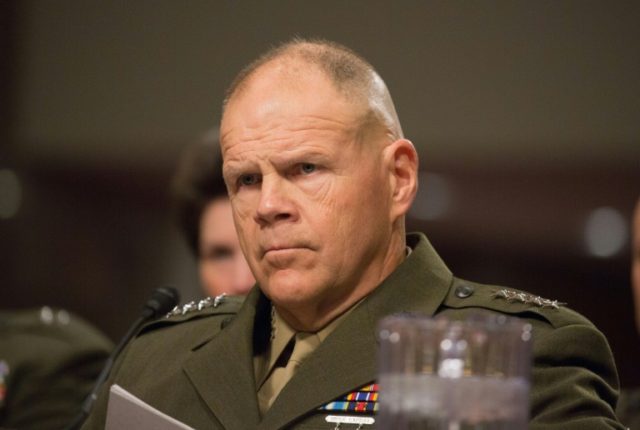WASHINGTON, DC — The highest-ranking officer in the U.S. Marine Corps described the American forces in Afghanistan as “Mujahideen” freedom fighters, or Muslim holy warriors, triggering criticism from some analysts.
Asked about security conditions in the opium-rich Taliban stronghold of southern Afghanistan, home to a U.S. Marine- offensive against the narco-jihadists group, Marine Corps Commandant Gen. Robert Neller told Pentagon reporters in responding on May 2:
There’s got to be a political settlement. And all of the efforts to reconcile with the Taliban through the Afghan government I think we all fully support.
…
The terrorists call themselves, you know, they’re the freedom fighters, they’re the Mujaheddin. They’re not. They’re criminals. I think the Arabic word is “takfiri.” They’re apostates. They hide behind Islam. They sell drugs. They kill innocent people. That’s not what Islam is. The Afghan army and the Americans — we’re the Mujahideen. That’s the message.
Echoing other analysts, an Afghanistan expert at Foundation for the Defense of Democracies (FDD) think-tank, blasted the U.S. commandant for using the term “Mujahideen” to describe American troops in Afghanistan.
Bill Roggio, who is also the editor for FDD’s Long War Journal, indicated that “Mujahideen” is used interchangeably with the word jihadi, telling Breitbart News:
A “mujahideen” is a Muslim who is waging jihad, or holy war, and these days the term is widely equated with jihadis.
Commandant Neller’s use of this word to describe American troops serving in Afghanistan is both inappropriate and offensive. The world cringed when President [George W.] Bush described the US war as a “crusade.” Neller’s comment is ridiculous on its face, and he should retract it.
During the Pentagon press conference on Wednesday, Gen. Heller noted that the Taliban has been at war against foreign forces in Afghanistan for decades.
Before taking on the United States, the group fought against the Russians, which the U.S. military believes it can now partner with against terrorism in Afghanistan after nearly 17 years against the Taliban and other jihadists.
Gen. Neller told reporters that the United States is trying to help Afghanistan establish the necessary security conditions to persuade the Taliban to no longer “continue to have their young men get killed.”
He added that the terrorist group is “being led by people that aren’t even there in the fight [in Afghanistan]. That live in other countries, and that are convincing them that this is the right thing to do when really all they’re doing is making money from drugs.”
Taliban terrorists, who generate hundreds of millions from the lucrative opium and heroin business in Afghanistan, have established a political office in Qatar.
U.S. Gen. John Nicholson, the top commander of American and NATO troops in Afghanistan, recently emphasized that Russia and Pakistan continue to lend support to the Taliban.
However, he noted that the United States hopes to work with Moscow on combating terrorist groups in the region that present a direct threat to Russia, namely the Islamic State (ISIS/ISIL).
Gen. Nicholson told Gandhara, a component of Radio Free Europe/Radio Liberty(RFE/RL):
We have a shared interest with Russia in Afghanistan. We both shared an interest in countering the terrorists who threaten our country, threaten Russia, and threaten Central Asia.
We have a shared interest in defeating Daesh (ISIS), we have a shared interest in counternarcotics, we have a shared interest in peace and stability in Afghanistan. And what we hope to do is to be able to work with Russia and all of the nations in the region to achieve these outcomes in Afghanistan.
According to the U.S. Inspector General for Afghanistan Reconstruction (SIGAR), a congressionally-appointed watchdog agency, the Taliban controls or influences more than 60 percent of southern Afghanistan’s Helmand, the top-opium and heroin producing province in Afghanistan.
Taliban jihadists generate the vast majority of their terrorist funding from the unprecedented level of cultivation and production of opium and heroin in Afghanistan, the world’s chief producer of the two deadly drugs.
Referring to the Taliban, Gen. Neller told reporters on Thursday:
They’ve been fighting, what, 40 years? And so we’re hopeful that, you know, we can support the Afghan military and the governor in Helmand, and the local police and the national police, and that we can create a secure environment so that the Afghans can have an election.
The United States has stationed at least 300 Marines in southern Afghanistan as part of the estimated 14,000 American service-members deployed to the war-ravaged nation.
Terrorists, primarily the Taliban, control or contest nearly half of the population and territory in Afghanistan.

COMMENTS
Please let us know if you're having issues with commenting.